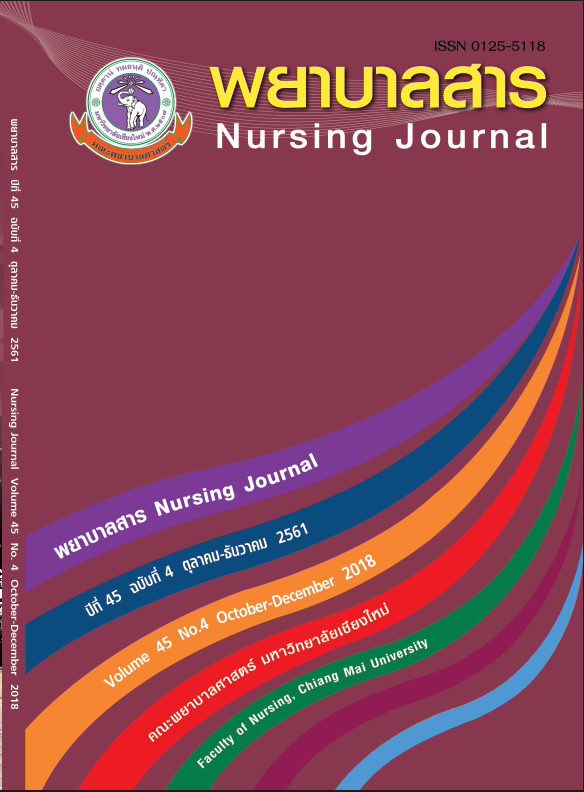Head Nurses’ Authentic Leadership and Job Satisfaction Among Nurses in General Hospitals, Central Region, Mongolia
Keywords:
Job satisfaction, authentic leadership, head nurseAbstract
The leadership style of head nurses is an important factor that has an effect on job satisfaction among nurses. The purposes of this study were to explore head nurses’ authentic leadership as perceived by nurses, and to explore job satisfaction and to identify the relationship between head nurses’ authentic leadership and job satisfaction among nurses in general hospitals in the central region of Mongolia. The sample consisted of 276 nurses, randomly selected from nurses working in five general hospitals. The research instruments were the Authentic Leadership Questionnaire (ALQ), developed by Walumbwa et al. (2008) and the Abridge Job Descriptive Index (aJDI), developed by Stanton et al. (2001). The ALQ and aJDI were confirmed for validity by the developers. Cronbach’s alpha coefficient of ALQ and aJDI were 0.90 and 0.85, respectively. Data were analyzed using descriptive statistics and Pearson’s correlation coefficient.
The results of the study indicated that:
- The head nurses’ authentic leadership as perceived by nurses was at a moderate level.
- The job satisfaction as perceived by nurses was at a moderate level.
- There was a statistically significant moderate positive relationship between head nurses’ authentic leadership and job satisfaction among nurses.
The results of the study could be used as baseline information for nursing administrators in planning and developing strategies to improve the leadership of head nurses and enhance job satisfaction among nurses. By improving head nurses’ authentic leadership, staff nurses’ job satisfaction will increase.
References
Avolio, Luthans, F., & Walumbwa, F. O. (2004). Authentic leadership: Theory building for veritable sustained performance. University of Nebraska-Lincoln. Gallup Leadership Institute.
Avolio, B. J., & Gardner, W. (2005). Authentic leadership development: Getting to the root of positive forms of leadership. The Leadership Quarterly, 16(3), 315-338.
Bozeman, B., & Gaughan, M. (2011). Job satisfaction among university faculty: Individual, work, and institutional determinants. Journal of Higher Education, 82 (2), 154- 186.
Burns, N., & Grove, S. K. (2005). The practice of nursing research: Appraisal, synthesis and generation of evidence. St. Louis, Missouri: Saunders, Elsevier.
DGH. (2012). Report of quality nursing care in Darkhan General Hospital, 2012: Darkhan- Uul, Mongolia. [in Mongolian]
Dockins, J. P. (2004). Person-environment congruence, job stability, and job satisfaction: an examination of Holland's theory of Vocational Personalities and work environments in the nursing profession. Doctor of education, the University of Memphis.
Gardner, W., Avolio, B., Luthans, F., May, D., & Walumbwa, F. (2005). "Can you see the real me?" A self-based model of authentic leader and follower development. The Leadership Quarterly, 16(3), 343-372.
Greenberg, J., & Baron, R. A. (2008).Behavior in organizations (9th ed.). Upper Saddle River, NJ: Pearson Prentice Hall.
HGH. (2012). Nursing Report of Huvsgul General Hospital, 2012: Huvsgul province, Mongolia. [in Mongolian]
Huston, C. (2008). Preparing nurse leaders for 2010. Journal of Nursing Management, 16, 905-911.
Indeed (2013). Nurses salary 2013. Retrieved from http://www.indeed.com/salary?
Kernis, M. (2003). Towards a conceptualization of optimal self-esteem. Psychological Inquiry 14, 1-26.
Laschinger, H. C., Wong, C. A., & Grau, A. L. (2012). The influence of authentic leadership on newly graduated nurses’ experiences of workplace bullying, burnout and retention outcomes: A cross-sectional study. International Journal of Nursing Studies 49, 1266–1276.
Locke, E. A. (1976). The nature and causes of job satisfaction. Chicago: Rand McNally.
Luthans, F., & Avolio, B. (2003). Authentic leadership development San Francisco: Berrett-Koehler.
Lux, A. A. (2012). Follower's perceptions of authentic leadership and their job
satisfaction. Electronic Theses and Dissertations, Auckland University, New
Zealand.
Ministry of Health of Mongolia, (2011).Annual Report.
Ministry of Health of Mongolia. (2012a). Mongolian Nursing Development Strategic
Plan 2012-2016. Ulaanbaatar, Mongolia.
Ministry of Health of Mongolia (2012b). Frame of job description of the health care
professionals. Ulaanbaatar, Mongolia.
Owusu-Bempah, J., Addison, R., & Fairweather. (2011). Does follower subjectivity matter in defining authentic leadership? A call for qualitative research. Asia Pacific Journal of Business and Management, 2(2), 1-25.
Government Resolution of Mongolia. (2012). Government officers payroll and
Amendments to the minimum standards of Mongolia. [in Mongolian]
Retrieved from http:// www.medee.mn/main.php?eid=10960
Solongo, D. (2010). History and development of Mongolian nursing care: a non-
thesis project. Ulaanbaatar, Mongolia. [in Mongolian]
Stanton, J., Sinar, E., Balzer, W., Julian, A., Thoresen, P., Aziz, S., Fisher, G. & Smith, P. (2001). Development of a compact measure of job satisfaction: The abridge job descriptive index. Educational and Psychological Measurement, 61(6), 1104-1122.
Walumbwa, F. O, Avolio, B. J., Gardner, W. L., Wernsing, T. S., & Peterson, S. J. (2008). Authentic leadership: Development and validation of a theory-based measure. Journal of Management, 34, 89-126.
World Health Organization. (2011). Strategic directions on industrial policy in
Mongolia. Retrieved from http: www.//unido.org/Data1/Statistics/Utilities/docnew.cfm?id
Wong, C. A., & Laschinger, H. (2012). Authentic leadership, performance, and job satisfaction: the mediating role of empowerment. Journal of Advanced Nursing, 69(4), 947–959.
Yamane, T. (1967). Statistics: an introductory analysis. Retrieved from
http://www.gobookee.net/get_book.php?
Downloads
Published
How to Cite
Issue
Section
License
บทความที่ได้รับการตีพิมพ์เป็นลิขสิทธิ์ของวารสารพยาบาลสาร
ข้อความที่ปรากฏในบทความแต่ละเรื่องในวารสารวิชาการเล่มนี้เป็นความคิดเห็นส่วนตัวของผู้เขียนแต่ละท่านไม่เกี่ยวข้องกับมหาวิทยาลัยเชียงใหม่ และคณาจารย์ท่านอื่นๆในมหาวิทยาลัยฯ แต่อย่างใด ความรับผิดชอบองค์ประกอบทั้งหมดของบทความแต่ละเรื่องเป็นของผู้เขียนแต่ละท่าน หากมีความผิดพลาดใด ๆ ผู้เขียนแต่ละท่านจะรับผิดชอบบทความของตนเองแต่ผู้เดียว






